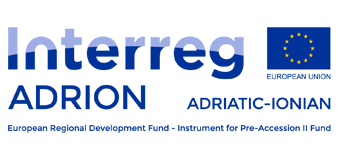How has ADRION contributed to circular and blue economy?
A conference held at ECOMONDO, one of the most important benchmark events in Europe around the topic of circular economy, hosted the ADRION event “Innovative experiences of Circular economy and Blue Growth in the Western Balkans”.
The event took place in Rimini last 11 November and showed an impressive contribution from our speakers and projects to the topic.

On Friday 11th November, speakers from the ADRION projects BIOECO RDI, CIRCLE, BLUE AIR, SEAVIEWS, SEADRION, and the Horizon 2020 proGIreg and Blue Bio MED projects met to showcase the contribution that EU funded projects has brought to raise awareness on circular economy and practically put in place its principles at transnational level, across the border of the EU and reaching out to the Western Balkans. The seminar provided also insights on circular economy applied to Blue economy, which means reducing the impact of economic activities at sea on the marine environment and let them support climate neutrality, zero pollution, circular economy and waste prevention.
The seminar opened with an introduction to the opportunities of both Interreg ADRION and Horizon 2020. The role of Interreg ADRION especially in the next programming period 2021-2027 was outlined by Lodovico Gherardi, coordinator of the Programme at the Emilia-Romagna Region. On the other hand, Serena Borgna (APRE) illustrated the impact of Horizon 2020 projects in the Western Balkans. Western Balkans countries are involved in all ADRION funded projects through the cooperation with sister agencies, institutions, and organisations across the Adriatic-Ionian region; the same happens for Horizon programmes in the R&I sector. Both funding schemes are supporting the pursuit of a zero-impact economy by encouraging the cooperation between EU and non-EU countries and take relevant measures to progressively de-couple resource consumption from economic growth.
The seminar showed good practices and experiences of re-use of several type of waste materials through a participatory approach, involving innovation and business actors, as well as civil society, as brilliantly expressed by Marco Affronte and Slaviša Jelisić from the project CIRCLE. But circular economy is much more than re-use of waste material, it regards also the production of food, fiber and fuel from renewable biological resources. In this frame, an outstanding contribution to the improvements made in the sector of bioeconomy in Italy and Serbia was made by Chiara Dall’Aglio, Sviluppumbria, and Milica Vračarić, Regional Agency for the Development of Small and Medium Size Enterprises Alma Mons Ltd. – Novi Sad, Serbia, both from the project BIOECO R.D.I.
Laura Ribotta, from the Municipality of Turin, presented proGIreg, an Horizon funded project targeting urban regeneration, where the cooperation of eight different cities developed nature-based solutions in post-industrial urban districts.
Stefano Valentini, from ART-ER, Emilia-Romagna Region provided with an excellent contribution regarding the role of the governance, such as the cooperation among public institutions and policy decision makers, for the developement of bioeconomy applied to marine environment in the Mediterranen area. To this end, the seminar highlighed the tight connection between circular economy and blue growth, as the principles of sustainability and reuse may apply also to the aquatic ecosystems.
Tibor Bešenic from the University of Zagreb and Artan Leskoviku from the Albanian Ministry of Infrastructure and Energy presented the results of the projects SEADRION showing the application of seawater pumps technology to cool public buildings in Croatia and Greece.
Challenges of Blue Economy have been adressed by Nikolaos Ventikos, National Technical University of Athens, presenting the efforts made by the project SEAVIEWS in monitoring marine pollutions through sensors displayed alongside the coast of the Adriatic and Ionian Seas. And surely opportunities, as clearly expressed by Christian Springer Area Science Park, Pordenone, Italy and Nataša Bojkovic, University of Belgrade, Serbia. The speakers showed the relevance of Smart Specialisation Strategy (S3) in the Blue growth sector and the study made at terrirorial level thanks to the project BLUE AIR.
For more information on the agenda click here






